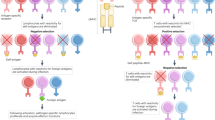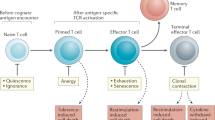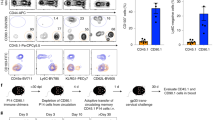Abstract
The thymus gland has been known for some time to be the central organ of differentiation of T lymphocytes1,2. Stem cells migrate into the thymus from the bone marrow, differentiate and, as competent T lymphocytes, disperse from the thymus to the periphery, where contact with specific antigen induces immune reactivity2. The traffic of T lymphocytes between the thymus and periphery has been thought to be unidirectional and, unless the cells are leukaemic3 or the thymus gland has been irradiated4, re-entry of peripheral T lymphocytes has not been detected3. We now report that cells from lines of functionally active T lymphocytes reactive to self or foreign antigens can migrate back into the normal thymus gland and persist there for relatively long periods in a quiescent state until activated by contact with antigen. Hence, in addition to being the seat of T lymphocyte differentiation, the thymus is open to two-way traffic with the periphery and may function as a repository of immunological memory.
This is a preview of subscription content, access via your institution
Access options
Subscribe to this journal
Receive 51 print issues and online access
$199.00 per year
only $3.90 per issue
Buy this article
- Purchase on Springer Link
- Instant access to full article PDF
Prices may be subject to local taxes which are calculated during checkout
Similar content being viewed by others
References
Miller, J. F. A. P. Lancet ii, 748–749 (1961).
Ford, C. E., Micklem, H. S., Evans, E. P., Gray, J. G. & Ogden, D. A. Ann. N.Y. Acad. Sci. 129, 283–296 (1966).
Stutman, O. Immun. Rev. 42, 137–184 (1978).
Kadish, J. L. & Basch, R. S. Cell. Immun. 30, 12–24 (1977).
Ben-Nun, A., Wekerle, H. & Cohen, I. R. Eur. J. Immun. 11, 195–199 (1981).
Ben-Nun, A. & Cohen, I. R. J. Immun., 129, 303–308 (1982).
Ben-Nun, A., Wekerle, H. & Cohen, I. R. Nature 292, 60–61 (1981).
Ben-Nun, A. & Cohen, I. R. Eur. J. Immun. 11, 949–952 (1981).
Gillis, S., Backer, P. E., Rusccetti, F. W. & Smith, K. J. exp. Med. 148, 1093–1098 (1978).
Johnson, P. K. & Mardiney, M. R. Transplantation 14, 253–260 (1972).
Ben-Nun, A. & Cohen, I. R. J. Immun. 128, 1450–1457 (1982).
Seabright, M. Lancet ii, 271–282 (1971).
Wekerle, H., Cohen, I. R. & Feldman, M. Eur. J. Immun. 3, 745–748 (1973).
Longo, D. L. & Schwartz, R. H. Nature 287, 44–46 (1980).
Bevan, M. J. Nature 260, 417–419 (1977).
Zinkernagel, R. M., Callahan, G. N., Klein, J. & Dennert, D. Nature 271, 251–253 (1978).
Elliott, E. V. Nature new Biol. 242, 150–152 (1973).
Jerne, N. K. Ann. Immun. (Paris) 125 C, 373–389 (1974).
Author information
Authors and Affiliations
Rights and permissions
About this article
Cite this article
Naparstek, Y., Holoshitz, J., Eisenstein, S. et al. Effector T lymphocyte line cells migrate to the thymus and persist there. Nature 300, 262–264 (1982). https://doi.org/10.1038/300262a0
Received:
Accepted:
Issue Date:
DOI: https://doi.org/10.1038/300262a0
This article is cited by
-
Reconstituting T cell receptor selection in-silico
Genes & Immunity (2021)
-
Protective Effects of Indomethacin and Cyclophosphamide but Not of Infliximab on Liver Metabolic Changes Caused by Adjuvant-Induced Arthritis
Inflammation (2011)
-
Peripheral T cells in the thymus: have they just lost their way or do they do something?
Immunology & Cell Biology (2009)
-
Back to the thymus: peripheral T cells come home
Immunology & Cell Biology (2009)
-
Re‐entry of mature T cells to the thymus: an epiphenomenon?
Immunology & Cell Biology (2009)
Comments
By submitting a comment you agree to abide by our Terms and Community Guidelines. If you find something abusive or that does not comply with our terms or guidelines please flag it as inappropriate.



